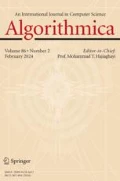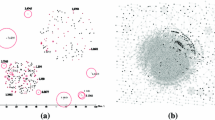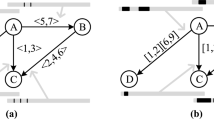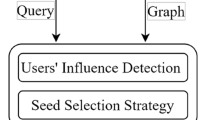Abstract
We study the problem of Counting the number of nodes in Anonymous Dynamic Network: nodes do not have identifiers and the network topology changes frequently. Counting is a fundamental task in distributed computing, for instance, to decide termination. Knowing what is the cost of anonymity is of paramount importance to understand what is feasible for future generations of Dynamic Networks, where the lack of nodes identifiers might facilitate mass production. Previous upper bounds to compute the exact network size are double-exponential. Strikingly, only linear complexity lower bounds are known, leaving open the question of whether efficient Counting protocols for Anonymous Dynamic Networks exist or not. In this work, we achieve an exponential speedup presenting Incremental Counting (IC), a distributed Counting protocol for Anonymous Dynamic Networks that has exponential time complexity and computes the exact size of the system. We complement the theoretical study evaluating IC experimentally. We tested a variety of network topologies that may appear in practice, including extremal cases such as trees, paths, and continuously changing topologies. Our simulations showed that IC is polynomial for all the inputs tested, paving the way to use it in practical applications where the network topology is predictable.





Similar content being viewed by others
Notes
It is important to notice that the concept of energy is used for illustration purposes only. That is, what nodes actually exchange is just a number. This concept has nothing to do with the energy consumed by nodes.
Throughout the paper, \(\log \) means logarithm base2, unless otherwise stated.
References
Almeida, P.S., Baquero, C., Farach-Colton, M., Jesus, P., Mosteiro, M.A.: Fault-tolerant aggregation: Flow-updating meets mass-distribution. In: Proceedings of the 15th International Conference on Principles of Distributed Systems. Lecture Notes in Computer Science, vol. 7109, pp. 513–527. Springer, Berlin (2011)
Avin, C., Kouckỳ, M., Lotker, Z.: How to explore a fast-changing world (cover time of a simple random walk on evolving graphs). In: Automata, languages and programming, pp. 121–132. Springer, Berlin (2008)
Baldoni, R., Di Luna, G.A.: Counting on anonymous dynamic networks: Bounds and algorithms (2016). Manuscript
Beveridge, A., Wang, M.: Exact mixing times for random walks on trees. Graphs Comb. 29(4), 757–772 (2013)
Casteigts, A., Flocchini, P., Quattrociocchi, W., Santoro, N.: Time-varying graphs and dynamic networks. Int. J. Parallel Emerg. Distrib. Syst. 27(5), 387–408 (2012)
Chakraborty, M., Milani, A., Mosteiro, M.A.: Counting in practical anonymous dynamic networks is polynomial. In: Proceedings of the 4th International Conference on Networked Systems. Lecture Notes in Computer Science, vol. 9944, pp. 131–136. Springer, Berlin (2016)
Di Luna, G.A., Baldoni, R.: Brief announcement: Investigating the cost of anonymity on dynamic networks. In: Proceedings of the 2015 ACM Symposium on Principles of Distributed Computing, pp. 339–341. ACM, New York (2015)
Di Luna, G.A., Baldoni, R.: Non trivial computations in anonymous dynamic networks. In: Proceedings of the 19th International Conference on Principles of Distributed Systems, Leibniz International Proceedings in Informatics (LIPIcs), vol. 46, pp. 1–16. Schloss Dagstuhl–Leibniz-Zentrum fuer Informatik, Dagstuhl, Germany (2016)
Di Luna, G.A., Baldoni, R., Bonomi, S., Chatzigiannakis, I.: Counting the number of homonyms in dynamic networks. In: Proceedings of 15th International Symposium Stabilization, Safety, and Security of Distributed Systems. Lecture Notes in Computer Science, vol. 8255, pp. 311–325. Springer, Berlin (2013)
Di Luna, G.A., Baldoni, R., Bonomi, S., Chatzigiannakis, I.: Conscious and unconscious counting on anonymous dynamic networks. In: Proceedings of the 15th International Conference on Distributed Computing and Networking. Lecture Notes in Computer Science, vol. 8314, pp. 257–271. Springer, Berlin (2014)
Di Luna, G.A., Baldoni, R., Bonomi, S., Chatzigiannakis, I.: Counting in anonymous dynamic networks under worst-case adversary. In: Proceedings of the 34th International Conference on Distributed Computing Systems, pp. 338–347. IEEE (2014)
Di Luna, G.A., Bonomi, S., Chatzigiannakis, I., Baldoni, R.: Counting in anonymous dynamic networks: An experimental perspective. In: Proceedings of the 9th International Symposium on Algorithms and Experiments for Sensor Systems, Wireless Networks and Distributed Robotics. Lecture Notes in Computer Science, vol. 8243, pp. 139–154. Springer, Berlin (2014)
Fall, K.: A delay-tolerant network architecture for challenged internets. In: Proceedings of the 2003 Conference on Applications, Technologies, Architectures, and Protocols for Computer Communications, pp. 27–34. ACM, New York (2003)
Fernández Anta, A., Milani, A., Mosteiro, M.A., Zaks, S.: Opportunistic information dissemination in mobile ad-hoc networks: The profit of global synchrony. Distrib. Comput. 25(4), 279–296 (2012)
Fernández Anta, A., Mosteiro, M.A., Thraves, C.: An early-stopping protocol for computing aggregate functions in sensor networks. J. Parallel Distrib. Comput. 73(2), 111–121 (2013)
Kempe, D., Dobra, A., Gehrke, J.: Gossip-based computation of aggregate information. In: Proceedings of the 44th IEEE Annual Symposium on Foundations of Computer Science, pp. 482–491. IEEE (2003)
Kuhn, F., Lynch, N., Oshman, R.: Distributed computation in dynamic networks. In: Proceedings of the 42nd ACM Symposium on Theory of Computing, pp. 513–522. ACM, New York (2010)
Levin, D.A., Peres, Y., Wilmer, E.L.: Markov Chains and Mixing Times. American Mathematical Society, Providence (2009)
Michail, O., Chatzigiannakis, I., Spirakis, P.G.: Brief announcement: Naming and counting in anonymous unknown dynamic networks. In: Proceedings of the 26th International Conference on Distributed Computing, pp. 437–438. Springer, Berlin (2012)
Michail, O., Chatzigiannakis, I., Spirakis, P.G.: Naming and counting in anonymous unknown dynamic networks. In: Proceedings of 15th International Symposium Stabilization, Safety, and Security of Distributed Systems, pp. 281–295. Springer, Berlin (2013)
Michail, O., Chatzigiannakis, I., Spirakis, P.G.: Causality, influence, and computation in possibly disconnected synchronous dynamic networks. J. Parallel Distrib. Comput. 74(1), 2016–2026 (2014)
Milani, A., Mosteiro, M.A.: A Faster Counting Protocol for Anonymous Dynamic Networks. In: Proceedings of the 19th International Conference on Principles of Distributed Systems, Leibniz International Proceedings in Informatics (LIPIcs), vol. 46, pp. 1–13. Schloss Dagstuhl–Leibniz-Zentrum fuer Informatik, Dagstuhl, Germany (2016)
Nedic, A., Olshevsky, A., Ozdaglar, A., Tsitsiklis, J.N.: On distributed averaging algorithms and quantization effects. IEEE Trans. Autom. Control 54(11), 2506–2517 (2009)
Nijenhuis, A., Wilf, H.S.: Combinatorial Algorithms for Computers and Calculators, 2d edn. Academic Press, New York (1978)
O’Dell, R., Wattenhofer, R.: Information dissemination in highly dynamic graphs. In: Proceedings of the 2005 Joint Workshop on Foundations of Mobile Computing, pp. 104–110. ACM, New York (2005)
Pelusi, L., Passarella, A., Conti, M.: Opportunistic networking: Data forwarding in disconnected mobile ad hoc networks. Commun. Mag. IEEE 44(11), 134–141 (2006)
Sinclair, A., Jerrum, M.: Approximate counting, uniform generation and rapidly mixing markov chains. Inf. Comput. 82(1), 93–133 (1989)
Acknowledgements
We thank Arnaud Casteigts for introducing the model to us, and Antonio Fernández Anta for useful discussions. This research was partially supported by ANR Project DISPLEXITY (ANR-11-BS02-014).
Author information
Authors and Affiliations
Corresponding author
Rights and permissions
About this article
Cite this article
Chakraborty, M., Milani, A. & Mosteiro, M.A. A Faster Exact-Counting Protocol for Anonymous Dynamic Networks. Algorithmica 80, 3023–3049 (2018). https://doi.org/10.1007/s00453-017-0367-4
Received:
Accepted:
Published:
Issue Date:
DOI: https://doi.org/10.1007/s00453-017-0367-4




